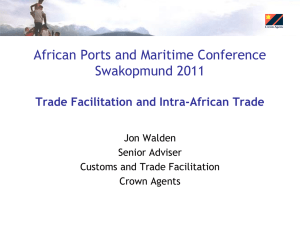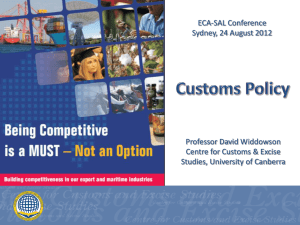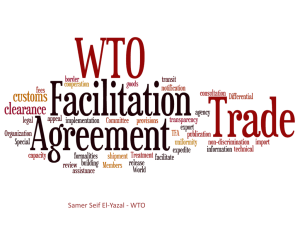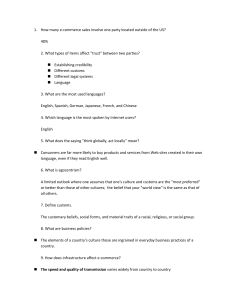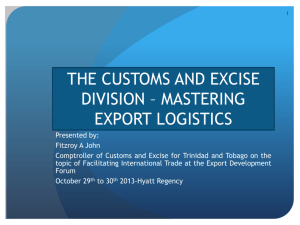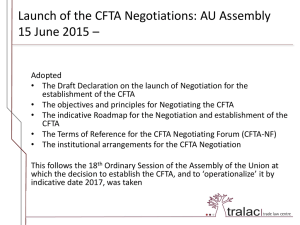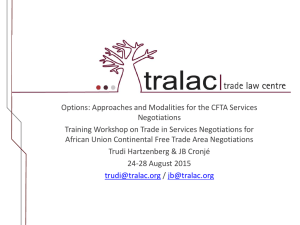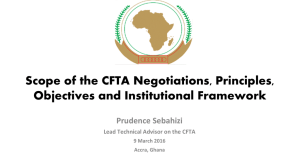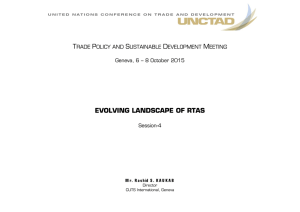14687-wd-directors_presentation-brazzaville_ccn
advertisement
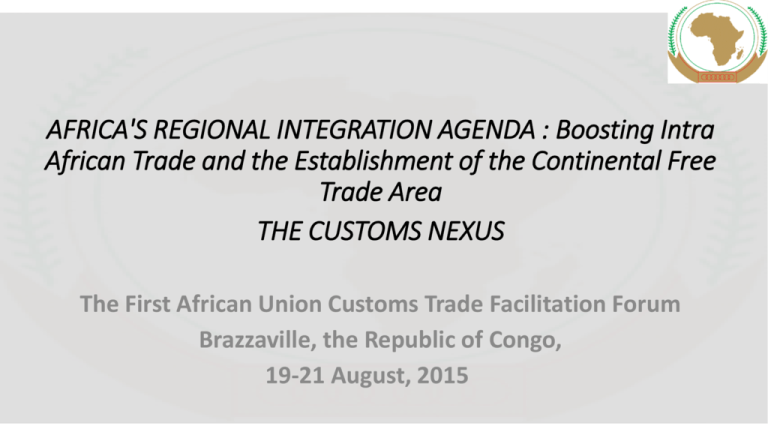
AFRICA'S REGIONAL INTEGRATION AGENDA : Boosting Intra African Trade and the Establishment of the Continental Free Trade Area THE CUSTOMS NEXUS The First African Union Customs Trade Facilitation Forum Brazzaville, the Republic of Congo, 19-21 August, 2015 Presentation Outline 1. 2. 3. 4. 5. 6. Africa's Trade Position and the 2012 Decision Agenda 2063 The Continental Free Trade Area The Role of Customs on the CFTA Action Plan for Boosting Intra African Trade Trade Facilitation Programs at the AUC - Implementation of the Trade Facilitation Cluster - Post Bali Project 6. What Can Trade Facilitation deliver for Africa? 7. The Role of Customs in Trade Facilitation Africa Trade Position Africa remains at 2.7 % of global trade Africa Trade more with the rest of the World that it self, Intra- African trade @12.3% as compared to Europe-Over 63% Informal trade is still significant Better terms when exporting overseas (EPAs, AGOA, GSP) whilst Africa’s biggest economies trading on an MFN basis A Myriad of challenges affecting Africa's Trade position, need to:• Addressing supply side constraints and weak productive capacities • Addressing Infrastructural bottlenecks • Enhancing opportunities for Intra-Africa Trade through trade information networks • Addressing access to finance for traders and other economic operators • Promoting free movement of people as important ingredient of cross border trade • Enhancing trade in services • Eliminating Trade Barriers through improved trade Facilitation 2012 Summit Decision DECISION ON BOOSTING INTRA-AFRICAN TRADE AND FAST TRACKING THE ESTABLISHMENT OF THE CONTINENTAL FREE TRADE AREA Endorsed the Framework, Road Map and Architecture for the Establishment of a CFTA by an indicative date of 2017 Endorsed the Action Plan for Boosting Intra Africa Trade Development partners to support the implementation of the Action Plan and the establishment of the CFTA; Member States supported by the Commission and the RECs to drive the process of boosting intra-African trade and the CFTA negotiations through The implementation of activities contained in the Action Plan at the national, regional and continental levels. Agenda 2063: The Africa We Want • A development framework rooted in Pan Africanism & African Renaissance aimed at the realization of the 21st century as the African Century • Based on seven Aspirations: Inclusive growth & sustainable devt, integration, good governance, peace & security, strong cultural identity, people driven continent, strong and influential global player Priority Areas for the First 10 Year Plan • High Speed Train Network; Establishment of the CFTA; The African Passport and free movement of people; The Pan-African E-Network; Implementation of the Grand Inga Dam Project; Implementation of the Yamoussoukro Decision on the Unification of African Air Space, The creation of an African Economic Platform. The CFTA we want CFTA is One of the flagship programs under the First Ten Year implementation Plan of the Agenda 2063 A people centred developmental FTA, that goes beyond tariff liberalization , but that which increases the choice variables of the African people An FTA that will help to address many of Africa’s most significant challenges, including: youth unemployment, migration, skills development, women’s empowerment, industrialization and infrastructure development. An FTA that will help Africa to strengthen its trade and investment relations and thereby unleashing its business potential including in its Services sector. An FTA that would help Africa integrate in the global value chains and strengthen Africa’s geopolitical position vis-à-vis the rest of the world CFTA progress so far June 2015 AU Summit Launched the Negotiations Adopted Decision and Declaration launching the negotiations • Endorsed the following documents: • The Negotiating Principles for the CFTA • Institutional Arrangements for the CFTA negotiations • The Terms of Reference for the CFTA-NF • The Indicative Roadmap for the CFTA negotiations The First Meeting of the CFTA-NF scheduled for October 2015 Scope of the CFTA Trade in goods • • • • • • • • • • Tariff liberalization, NTBs, RoO, Trade Facilitation • Customs coop • Harmonization of Doc • Transit & Transit facilities, Trade remedies, Standards, Technical Barriers 2 Trade SPS Dispute settlement Institnl arrangements Trade in Services • Transportation • Telecommunication • Air, maritime • Financial Services • banking, • insurance, • Tourism, • Energy, Other Issues • Competition policy • Intellectual Property Rights, • Investment • Movement of business persons, Phase I : Trade in Goods and Services Phase II: Comp, IPR, Investment The Role of Customs Administration in the CFTA process Customs Administration are core in the effective implementation and administration of any Free Trade Area. Pre-Negotiation Phase:Participation in the Negotiations • Tariff liberalization, • Specific Annexes on RoO, Trade Facilitation, Customs cooperation, Transit & Transit facilities, Post-Negotiation: Consistent of determination Rules of Origin Criteria • Key to conferring origin in an FTA Proper and application of Classification and Valuation procedures • E.g - Crucial in determining Product specific RoO The BIAT Action Plan & Clusters Trade policy • Effective institutions public and private • Effective implementation of regional FTAs Productive Capacity • Building the productive capacity • Trade agreements that work for SMEs • AIDA, AMV, CAADP Trade Facilitation • Customs – Harmonisation of procedures and documents • Transit Procedures • CBM/IBM Cluster… Trade related Infrastructure • Infrastructure development • Trade Logistics • Trade related services Market Integration • Free movement of business persons • Cross border establishment Trade Finance • Access to trade finance Information Cluster What can Trade facilitation Deliver for Africa? Trade facilitation measures, if well implemented would; • Benefit consumers who have to contend with higher prices induced by red tape in imports administration, • Assist in enhancing Africa's competitiveness due to reduction in compliance costs, service charges, business opportunity costs, and costs associated with uncertainty and corruption. • Enable firms to increase their continental share of trade in goods and services as a consequence of lower transactions costs. • Benefit govts by bringing about more efficient control methods, better resource allocation, and improved trade compliance leading to higher revenues, • Improve the investment climate which lead to increase in FDI flows and ultimately lead to faster economic development, • Assist in promotion of protection of security, society and human health through risk management control systems while facilitating legitimate flows of trade BIAT Trade Facilitation Cluster Vs the WTO TFA Program/activity Output/ target Link with relevant Articles in the WTO ATF Article 5: Other measures to enhance impartiality, nondiscrimination and transparency Action(s) Taken this far Workshops on Issues of Integrity and Ethics in Customs which produced a set of recommendations to the 5th and 6th Meeting of the AUSCDGCs for further action. A Brazzaville Declaration on Integrity and Ethics 1 Reduction Road blocks of All unnecessary roadblocks are removed 2 Harmonizing and simplifying customs and transit procedures, documentation and regulations Number of Customs documents are reduced Key Customs Documents are harmonized within RECs Border operation hours are harmonized Article 1: Publication and availability of information Article 2: Opportunity to comment, information before entry into force and consultations Article 3: Advance rulings Article 4: Procedures for appeal or review Article 7: Release and clearance of goods Article 10: Formalities connected with importation and exportation and transit Article 11: Freedom of transit Seminar on the Revised Kyoto Convention in 2013. Recommendations of the Seminar were adopted by the 5th Meeting of the AUSCDGCs for further action. Establishment and operationalization of One stop Border post (OSBPs) Integrated border Management (Coordinated border management) OSBPs at key border posts established and border time crossings of goods are reduced by 50% A Field visit by the AU Technical Working Group on Transit to the Chirundu One Stop Border Post on the Zambia Zimbabwe Border. 3 4 Goods clearance procedures simplified and clearance times reduced Article 12: Customs Cooperation Article 8: Border agency cooperation Article 10: Formalities connected with importation and exportation and transit A Draft AU Protocol on Transit was produced. Work foreseen to be continued under the CFTA Agreement as an Annex on Transit Statement of Policy on Interconnectivity for use by Member States An AU Roadmap and Strategy for Interconnectivity of Computerized Customs Clearance and Information Systems Workshops on IBM/CBM with Recommendations to the AUSCDGCs for further action Development of A Draft AU Border Strategy Workshop on Implementation of National Single Window with recommendations DFID Post-Bali Support to the AUC on the WTO TFA • Development of an overall AUC TFA implementation support strategy, building on the BIAT Action Plan and other continental initiatives. • Design and development of an AU TFA e-platform to monitor implementation progress and the TA needs of member states and provide regular TFA-related analysis to the AUC and its structures. • Development of a viable business dialogue platform to engage with PSOs and corporates on TFA implementation. • Mapping on-going and planned TFA-focussed assistance from bilateral and multilateral development partners. • Briefing reports on TFA implementation status and donor support in Africa. Analysis of Category A notifications by AU MS Role of Customs in Trade Facilitation implementation • Good understanding /knowledge of the TF measures and capacity Building on some specific Articles of the agreement (e.g. Border agency cooperation, advance Ruling and Customs Cooperation • Designing Organizational and institutional Frameworks to support the effective implementation of the TF Measures and the TF Agreement • Taking part in the adaption of the existing legal framework (Customs National and Regional Customs Codes and Management Acts) to be in line with the TFA Agreement • Advocating for the accession to the WCO RKC. Crucial to any Customs Modernization programs • (Africa 23 out of 52, WCA Region 9 out of 23) Thank You
